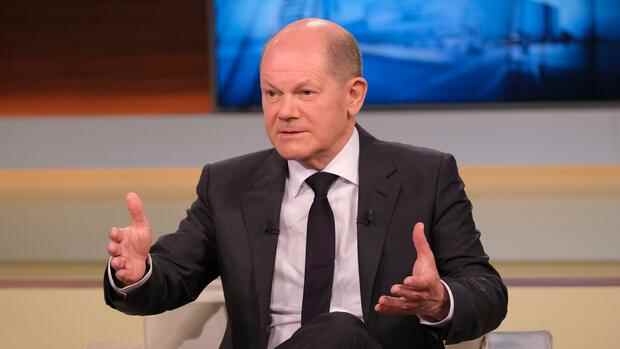The Chancellor speaks on the talk show “Anne Will” about the consequences of the Ukraine war.
(Photo: dpa)
Berlin Chancellor Olaf Scholz has rejected criticism that Germany is helping to finance Kremlin chief Vladimir Putin’s war in Ukraine with its energy imports from Russia. “Russia currently cannot do anything with the money it is storing in its accounts because of our sanctions,” said the SPD politician on Sunday evening on the ARD program “Anne Will”. It’s about a few hundred billion in foreign exchange reserves. “Therefore, it is very unlikely that this connection even exists.”
Germany’s dependence on Russian energy imports will be eliminated “quite quickly”. With coal, if everything goes well, this could happen quickly this year, Scholz announced. This can also happen very quickly with oil. And for gas, plans that had been in the drawer for a long time have “now been activated”. The technical infrastructure is being created at great speed in order to be able to import gas from other suppliers.
Scholz again rejected an immediate import boycott. He warned: “It’s about an unbelievable number of jobs.” Conversely, should Russia end its exports, Germany would be prepared. “But if these imports stopped from one day to the next, it would mean that entire branches of industry would have to stop their activities.”
Scholz also rejected the Ukrainian proposal for a one-month embargo. Responsible politics must have the courage to speak the truth. “And the truth is that if we did that, we would trigger a major economic crisis.” It wouldn’t be that easy to do in Europe either. For example, Italy is highly dependent on Russian imports. Some Eastern European countries have networks that are linked to the Russian network from earlier times, but not to the Western networks.
Top jobs of the day
Find the best jobs now and
be notified by email.
Scholz also announced that the NATO countries and Germany would be significantly upgraded to protect themselves against possible attacks by Russia. “We make ourselves so strong that nobody dares to attack us,” he said. That was also the message to Russian President Vladimir Putin: “Don’t you dare”. Scholz emphasized that all NATO partners in Eastern Europe could rely on the obligation to provide assistance and that the USA and Germany played a special role in this.
“An attack … would be an attack on ourselves,” he said of a possible threat to Poland or the Baltic states from Russia. He pledged that Germany would fulfill the NATO commitment to spend two percent of economic output on defense. The Bundeswehr plays a central role in the defense of the alliance and the country, especially with the possibilities “on the ground”: “Only the USA and Germany will have the strength that is necessary for the entire alliance.” This will have to be organized . “Everyone can rely on that,” emphasized the Chancellor.
No tax increases
On the subject of defense in Germany, Scholz confirmed that the federal government is considering purchasing a missile defense system. “It’s definitely one of the things we advise on, and for good reason,” he said. Earlier, politicians in the traffic light coalition had brought up the purchase of an Israeli missile defense system for Germany. The SPD politician is also committed to the two percent of the NATO countries.
In terms of financing, Scholz makes it clear that he rejects tax increases and at the same time sticks to the debt brake. He referred to the agreements of the traffic light parties in their coalition agreement. “We have reached an understanding in the coalition between the three parties on the issues of both the debt brake and the issue of tax increases. And all three of them will ultimately stick to them.”
When asked whether the debt brake would be observed again in the coming year, the SPD politician said: “It’s in the Basic Law.” Scholz referred to earlier statements about the Corona crisis that Germany was able to quickly get a lot of money for maintenance to mobilize the economy and jobs because it had done well before and reduced the national debt. “One thing is clear: this is for the crisis,” he said, referring to the current high level of borrowing. “But there is also a time without a crisis.”
More: Putin’s war of aggression in Ukraine triggered a chain reaction on the commodity markets. This is just the beginning of a global struggle.
